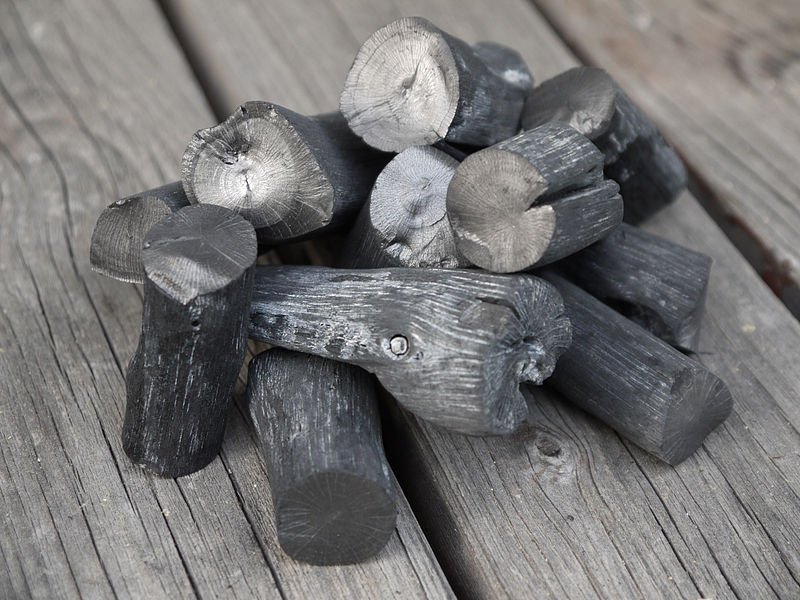A booming business is literally fueling the economies of many nations in Africa: Charcoal. This back-to-basics approach to energy production has grown from a simple cooking method to a source of power and economic empowerment.
In the last 20 years, charcoal production has soared in African nations, by some estimates doubling. Individuals are making money as charcoal producers and resellers, while entrepreneurs are making products specifically designed to utilize the black, dusty energy source.
A great NY Times article gave a glimpse into the lives the charcoal boom is changing. The article shows that the charcoal boom is very real. And so is the damage it is doing to the continent and the people who live there. Read on to understand the energy lighting Africa’s fires and its very dark side effects.
First off, what is charcoal?
 Japanese Binchōtan (Japanese high-grade charcoal produced from ubame oak).
Japanese Binchōtan (Japanese high-grade charcoal produced from ubame oak).
Charcoal is made from wood. Standard wood is burned in a low oxygen environment. The burning process removes water, methane, hydrogen, and tar from the wood. The result is small chunks of “char” that are almost pure carbon. These char-coals (see where that word comes from?), are a much more efficient source of heat than regular wood.
Benefits of charcoal
- ● Charcoal burns hotter and longer than standard wood
- ● Charcoal is significantly smaller and lighter than wood, making transportation of it easier (and also cheaper)
- ● Charcoal can be stored for long periods of time without any loss in potency. By comparison, wood can rot or be attacked by insects. Kerosene or gas can become unstable.
Why is charcoal so popular in African nations?
To put it simply: It’s readily available. Seriously, charcoal at the moment is available in every corner of the continent. Anywhere there are trees, industrious people are making and providing charcoal to consumers who depend on it for their daily cooking and power needs. Compared to Kerosene, cooking gas, or electricity, charcoal is much easier to find. It is also cheaper.
About 80 percent of households on the African continent rely on charcoal as a primary energy source. The continent consumers more than 23 million tons a year.

Who’s benefiting from the boom in charcoal?
Pretty much everyone.
People get a cheap and available power source. Cooking with charcoal is more efficient than cooking with regular wood, speeding up a process mostly taken on by girls and women. When less than 10 percent of the rural population in sub-Saharan Africa has access to electricity, any source of energy is crucial.
It’s a huge business opportunity. As other industries collapse and ways of life change through urbanization, enterprising people from every country in Africa are turning to charcoal as a way to either supplement or become the main source of their incomes. In Tanzania alone, the charcoal industry, while largely informal, was valued at over $150 million USD a year – and that estimate was in 2009. Since then the market has grown substantially.
It’s not just those producing the charcoal that are benefiting. Entrepreneurs are developing more efficient charcoal stoves and other related products to get in on this black dust boom. Examples include Toyola Energy Ghana, which won the Ashden Award for Sustainable Energy award in 2011 for their work providing efficient charcoal stoves to over 150,000 households.
So what’s the problem? Oh yeah – it’s killing people and the environment.
Charcoal has put deforestation into overdrive, exacerbating already deadly climate change effects and is killing people in their homes.
The World Health Organization says smoke from fires that burn solid fuels like wood, dung, coal and charcoal are killing more than 10,000 people a day. The US government estimates “smoke from open fires and stoves claim 4.3 million lives each year. That’s more than AIDS, malaria and tuberculosis combined.”
Deforestation in general is a huge problem across Africa. Researchers warn that some areas in South Africa could fully exhaust their fuelwood reserves by 2020. The situation is not any better in other African nations.
So now what?
Charcoal is both a boon to African nations and a burden. A first step is protecting people from the immediate impacts on their health. The UN, the US government, and many others are working hard to provide individuals with “clean burning” cook stoves.
The next step is looking at the wider impacts of the charcoal boom is having on the environment. Deforestation is a massive problem with a wide range of related impacts that will increase the dangers being brought by climate change. Unfortunately, regulation of the charcoal industry in most African nations has been spotty at best and non-existent in most places.
Longer term, the economic benefit of charcoal must be replaced with new development options. Sustainable and safe energy options must be brought to rural and poor populations. And individuals seeing climate change and urbanization destroy their livelihoods must have educations and opportunities to build new businesses that do not have the negative impacts of charcoal.